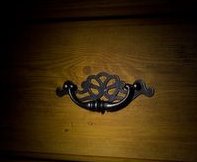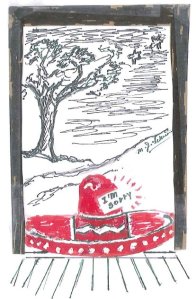(Published in the NY Times July 15, 2010)
 Over the years my mother wrote short stories about events in her life and kept them in a box under her bed. The stories were fascinating to read because they took us back in time to a place where we grew up. Last year, my mother organized her stories into a small book, “And So.”
Over the years my mother wrote short stories about events in her life and kept them in a box under her bed. The stories were fascinating to read because they took us back in time to a place where we grew up. Last year, my mother organized her stories into a small book, “And So.”
Now, at 77, my mother spends her mornings working the front counter at a bakery, greeting loyal customers and, every once in a while, selling a book to a local resident who also likes to reminisce.
Last week my family flew in from San Diego to see relatives and friends. We wanted our children to see the old family photographs, so my mother reached under the bed and pulled out the box. She showed us some we hadn’t seen in years.
While we were sharing memories on Tuesday, we heard the news that George Steinbrenner had died. My mother went into her bedroom and opened her dresser drawer. She pulled out more than a dozen letters from George dating to 1949. She had spoken of them before but now asked if I would like to read them. Instead I asked her to share her memories with us, and here is what she told us:
I met George on a summer’s evening in 1949 when I was 16. My family had recently moved to Bay Village, Ohio. I was sitting on the grass beneath a splendid oak tree in our front yard when a streamlined, powder-blue Plymouth convertible sporting the license plate G7S pulled into the driveway across the street, at the home of the football captain. Lo and behold, a handsome young man got out of the car. Then for no apparent reason he looked in my direction and waved.
Over the next four years, George and I sat underneath the oak tree and shared our ideas and dreams. One of his dreams was to run in the Olympics. I am not quite sure if that was his dream or a need to please his father.
Every birthday and special occasion, George sent me a dozen gorgeous American Beauty roses. Seeing they came from the local florist shop and being a suspicious teenager, I’d ask the shop’s owner if George sent roses to other girls. The answer was no. But what else would he say?
We often visited the ice cream parlor in the center of our small town. Each of us would order a milkshake, although I could seldom finish mine. George would insist I take the remainder of the milkshake home. This was accompanied by a lecture from him on the evils of wastefulness.
During those years we went to movies, football games, baseball games, parties and once in a while to watch the trotters at the Thistledown Racetrack. Only once did George become angry with me.
We attended a dinner dance at the University Club in Cleveland, and after a rather tiresome dinner, the band began to play the Mexican Hat Dance. George asked me to dance.
I refused, saying, “It’s a silly dance and I don’t want to look foolish.”
George responded, “If you continue to say no, I am taking you home right now.”
And he did. You can imagine the ride back to Bay Village. The silence was deafening.
When we arrived at my house, George, ever the gentleman, helped me out of the car and guided me up the porch steps to the front door. When he started to leave, he looked me straight in the eyes and said, “Don’t expect me to call you again.”
Early the next morning the phone rang. It was George. “Look on your front step.” I hurried to the front door, opened it and there, in all its glory, was a bright red sombrero with a small sign pinned to it saying, “Sorry.” In those days it wasn’t in George to stay angry.
In the late fall, hand in hand, we would stroll along the shores of Lake Erie while watching a golden sun melt into a frosty horizon. We were two young dreamers in harmony with each other and the world around us.
As time went on, we went to separate colleges and gradually grew apart. But I’ll always remember him as a fun-loving, kind and generous young man who brightened my youth.
In a letter from George dated May 15 1950, he addressed me by my maiden name and wrote: “Well, Elster, I bought a pair of white bucks today, and I thought you would be pleased to know that I plan to wear them all around the Hicksville town we live in. You can laugh till the cows come home, and it won’t bother me.”
He did wear the shoes, and I did laugh till the cows came home.
Mary Jane Schriner

